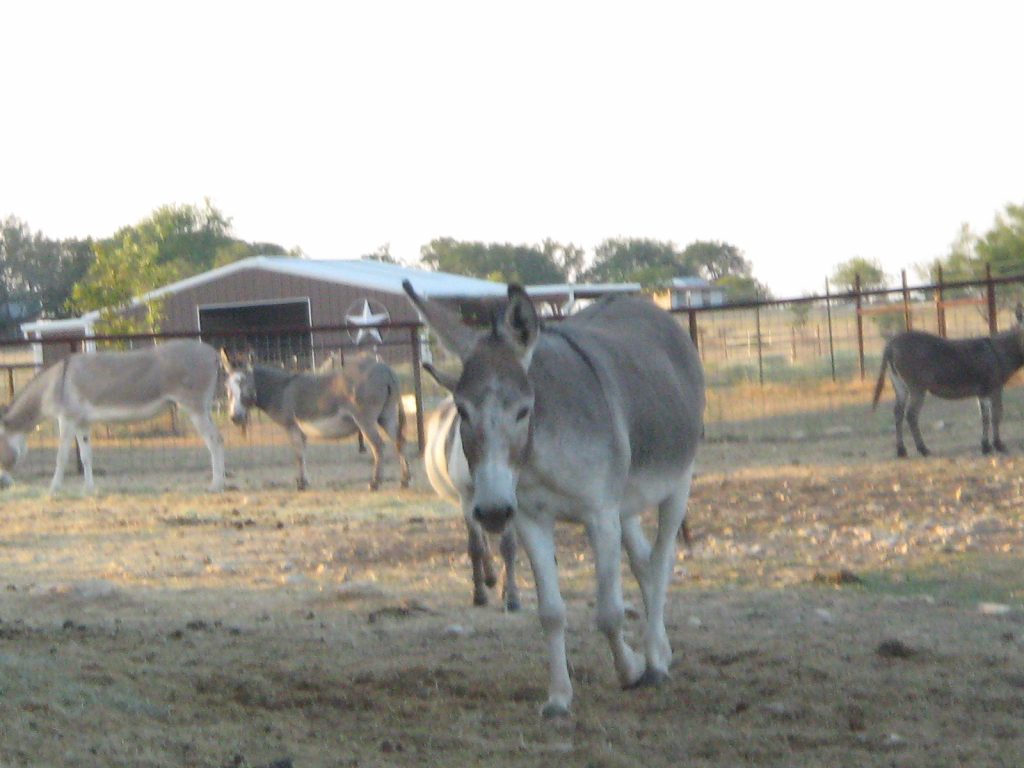By Annie Phenix, CPDT-KA
We had her final day planned.
Our much-loved donkey, Jillkey, had been resolute in her fight to stave off an early death at 15 years old – young for a donkey — but her illness was winning the battle. I knew her days where numbered when she refused to eat the donkey-pleasing meal we made for her every day that consisted of carrots, grain, beat pulp, salt, tums and corn oil. She had already dropped a lot of weight very quickly over the past two months. The veterinarian had been out to see her three times and each time he said, “the only reason this donkey is still alive is because she is still eating. She has to eat.”
I called the horse vet when she couldn’t eat her grain any longer. She wasn’t even interested in licking her meal.
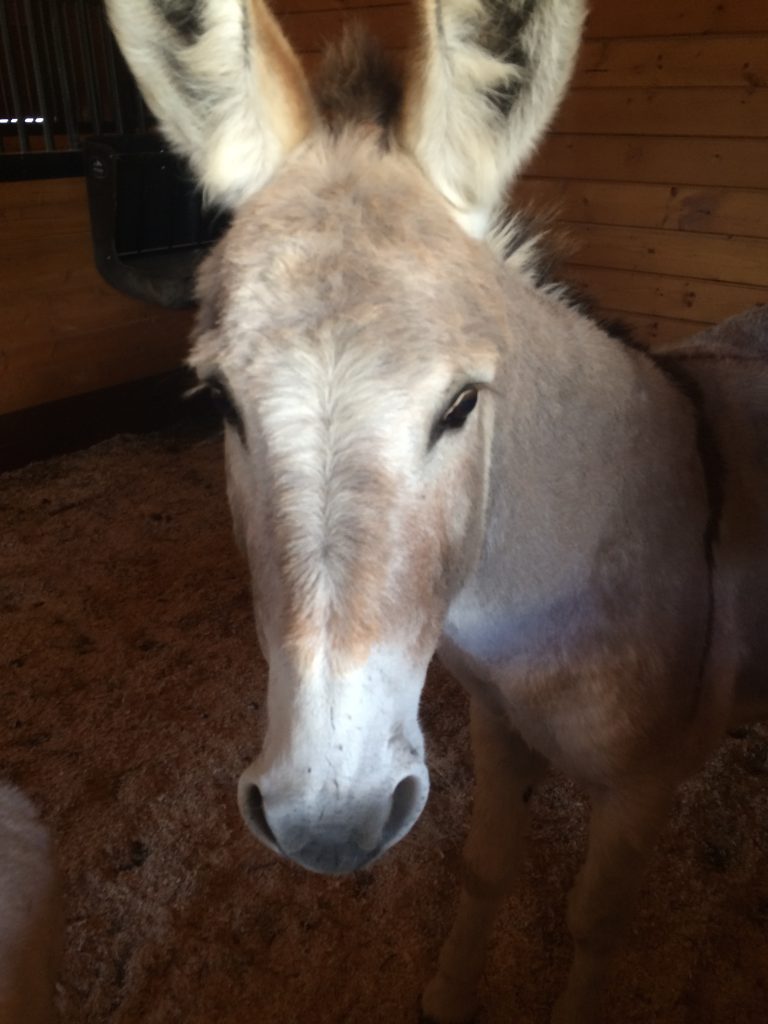
It takes planning to put down an equine. I had never had to have a horse or donkey put down before, even though I had had equines for 20 years, though I knew we needed to have a back hoe on hand. Through kind neighbors, I had a man with a back hoe loaded on his trailer on standby. It is hard to think about what to do with a donkey after she passes while she is still alive and your heart is still intertwined to hers. I wanted our smart, compassionate veterinarian to come out and confirm that our donkey’s valiant battle was coming to an end. It is the hardest responsibility of an animal lover and keeper to decide when to end an animal’s suffering. I wanted to give her every day of life I could, but I also didn’t want her to suffer a day longer than she had to.
Jillkey had been very ill for months. I had blood work run three times and our highly experienced vet said he had never seen lab work like our donkey’s results. He had no answers for her wasting figure or her malaise. He had single-handedly saved every equine of ours he was called out to help for years. He was so talented that I had learned to remain calm and call Dr. Ben when there was any hint of an equine ailment because he would have a way to help our horses and donkeys… until he didn’t. He didn’t know why our donkey was dying, but she surely was.
Months after I made the first call for Dr. Ben’s help, sweet Jillkey seemed to be nearing the end. Dr. Ben said that one of her many concerns was “lipedema,” a wasting disease that he had never once seen a donkey recover from. He acknowledged that I had a special gift with animals and one of those gifts was putting fat on them. I hate to see starving animals and I did excel at plumping even the un-plumpable. We began a feeding routine with Jillkey that was based on the results of what we could gleam from her lab work, such as low sodium and calcium levels (hence the added salt and Tums). Some days she ate well, some days she merely gummed the food. For two months, however, her weight remained steady and her attitude seemed to be that of an ill donkey who also still seemed to get enjoyment in being alive. Life is precious, even to a donkey. We gauged her contentedness by our understanding of equine behavior, as well as how alert her eyes and ears remained.
One Friday at feeding time, Jillkey walked into the stall where I fed her her special meals away from the other donkeys so she could be assured of getting it all. I gasped watching her eat as I could now clearly see her spine and hip bones. Any little bit of padding she had disappeared, seemingly overnight.

Dr. Ben came out the next day. He got down to our barn before I did and jumped the fence to take a look at Jillkey, who had all morning been standing under a tree, barely moving, ears down, eyes dejected. I came through a stall door with a halter in my hand to catch her. One of my dearest friends, Jan, came with me for moral support as we had already discussed that I am not the one who should be holding an animal when it is put down. I become hysterical even when I know it is time for the animal to pass. As a dog trainer specializing in canine behavior, I know all about emotional contagion and I never want to be the human contributing to an animal’s stress and especially on their last day. My husband was working out of state or he would have been there to hold Jillkey’s halter as the vet administered the final drugs to ease Jillkey into her last moments. Jeff loves our animals deeply but he is stronger than I when an animal is dying and he has sat with every one of our animals as they passed.
My friend Jan said she could do this for the donkey, and for me. The plan was for me to get Jillkey, say my goodbyes and hand the halter to Jan and Dr. Ben. Then I would retreat to the house and do my weeping there.
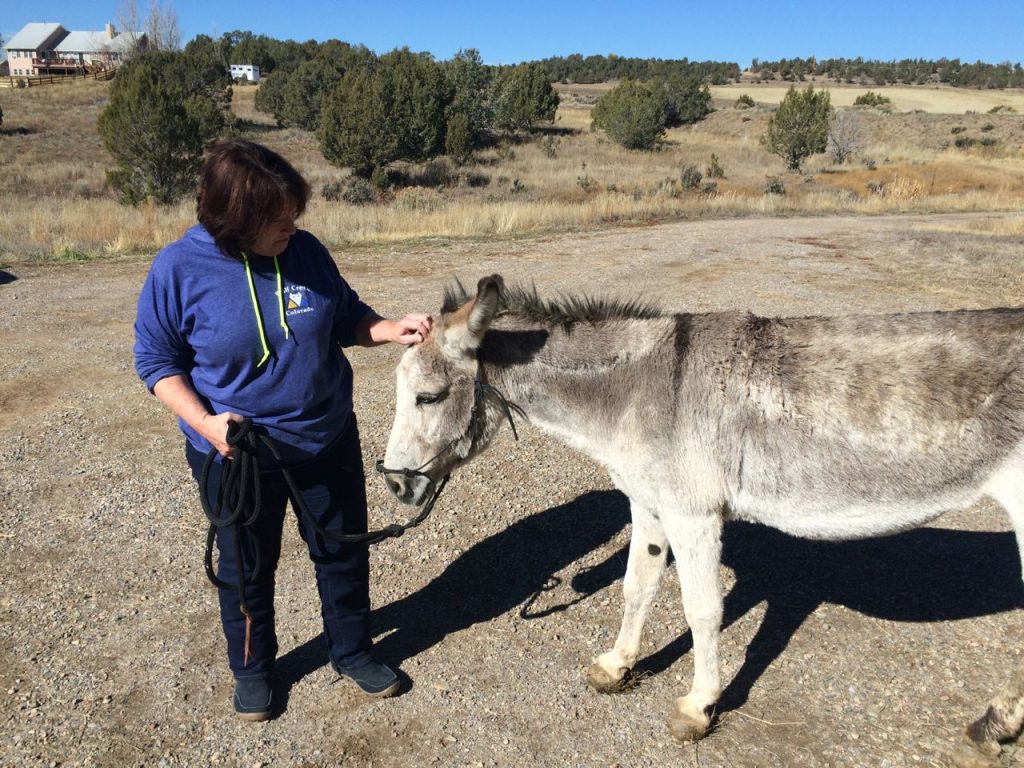
On this day, however, Jillkey said: no. She ran from me as I walked towards her with the halter. She RAN. She had not run in weeks. I looked at Dr. Ben and he looked back at me, saying “today is not her day.” She gave herself a reprieve.
As happy as I was to see some feistiness left in Jillkey, we all knew it was a temporary reprieve. The antibiotics and other measures we used to try to help her win her battle had no effect. She was dying. I was distraught and in no small part because of my 10 years of caring for Jillkey, and because I knew her history. I blame her early history and maltreatment at the hands of a cruel cowboy for her early demise.
Jillkey had faced death before. The first time I could stop that from happening to her, and I did. When we lived in Texas, sometimes against my better judgment I went to animal auctions. They were depressing because the animals were terrified and usually malnourished. The auction staff were not kind to the animals they pushed through the auction alley ways. They had a job to do and they did it without any attachment to the animals. Many of the equines where forced out into the auction room to be purchased by horse and donkey meat slaughter buyers. These were more than reasons enough for me to stay far away from auctions.
I went to my final auction in a small Texas town east of Austin. The conditions were deplorable: wet and muddy stalls held sad, un-vetted and often injured animals that were crammed into small spaces. Environmental change can be hard on all animals – and talk about fear being an emotional contagion at such a place! I walked the back alleyways and spotted three pathetic looking donkeys whose eyes were wide and the whites showings in their eyes screamed FEAR. There was one uncut jack and two terribly skinny jennys. They huddled together as closely as they could together, not understanding where they were or what was happening that day. I knew who the slaughter buyers where and watched them as they walked down the alley way talking about their prospects. I moved away from them as a deflection against what they did for a living but also because I knew myself well enough that this was not the day to have a chat with them about why it is that horse meat was illegal to sell in the US but they were free to purchase the US equines, get slaughtered in the US (at that time) and ship the meat to countries where it was legal. We would never allow that for dogs so why was it allowed for horses?
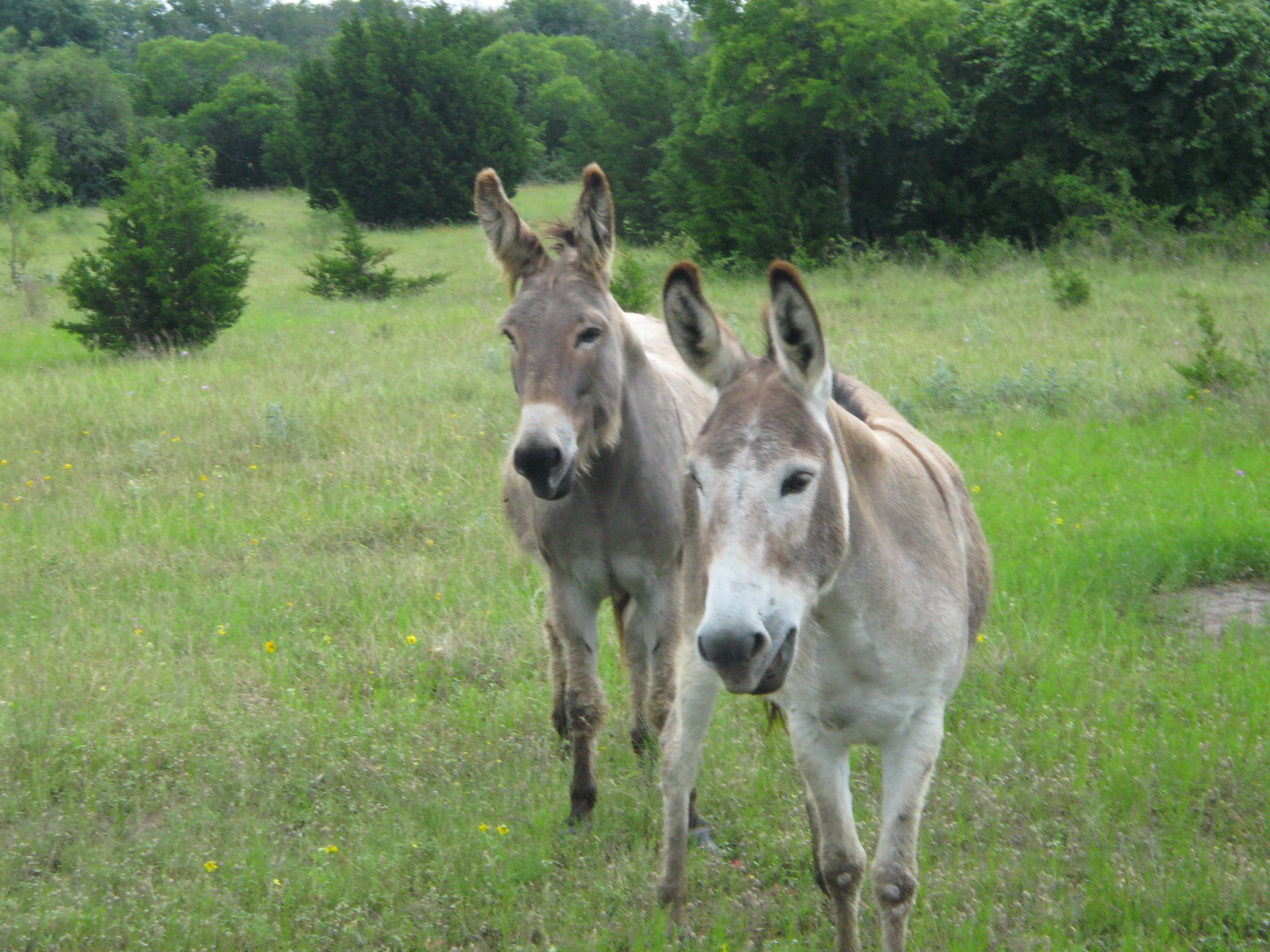
I heard the slaughter buyers laughing and watched at they pointed at the skinny, trembling donkeys. A younger cowboy walked up and said they were his donkeys. He bragged about using them as “roping donkeys,” which meant using them as though they were cattle to train their roping horses to chase down and rope the necks or feet of the donkeys. “No sense in running the fat off my cows,” he said to more cackling. He neglected to mention that he saw no need to also feed these terrified donkeys as they were skin and bones.
I knew the fate of these donkeys. The slaughter buyer would get them cheaply as they were so skinny and they were just “useless” donkeys. He’d fatten them up for a few weeks and thus get more per pound for their meat. I was not going to let that happen to these three donkeys, even as I knew that sad scenario would be repeated that day hundreds of times and at hundreds of other Texas auctions. I couldn’t save them all but I could help these three.
Sometimes you can “pre purchase” equines at some auctions before the animals are run through the auction room. I sucked down my disgust at the slaughter buyer still yucking it up with the young cowboy.
“I would like to buy your donkeys,” I said it loudly. They both ignored me. I tapped the cowboy on the shoulder and repeated myself.
“Why? What do you want them rag tag animals for?”
“I want them to protect my sheep herd,” I lied, as I had no sheep then. I intuitively knew that if I said anything about their pathetic condition or that I loved donkeys, their price would increase on the spot. Love of animals was not welcome in the auction house.
“How much you willing to give me?” he asked.
I had sat thru many auctions and at that time, donkeys weren’t worth anything. Many would sell for $25 or less. I offered him $100 per donkey.
“Nah,” he said, walking off with the slaughter buyer.
Fine. See you inside, boys.
I waited all day for the three skinny donkeys to come out. It took all of my resolve to not raise my bidding paddle for every sick and scared equine that came through the auction ring – which would have been most of the animals there. Finally the three terrified donkeys were moved into the auction room with the aide of paddles that the auction staff hit them with to get them moving.
The slaughter buyer bid first. I took a breath and raised my paddle. He saw me and gave me a hard look and raised his paddle. We did a back and forth for a few minutes and the donkey price kept going up. After awhile I saw that the slaughter buyer would raise his paddle and then nudge the other slaughter man standing next to him and they both would stifle their laughter. I knew what they were up to. They no longer wanted the skinny trio. They did want to run up the price on them so as to make me a soft-hearted joke for having to pay a lot for “useless,” skinny donkeys. I started delaying my paddle-raising to the last second to let him know I might change my soft heart and stick him with a high donkey bill. Finally, I won. I had just purchased three sickly looking donkeys for several hundred dollars. The well-fed and unshaven slaughter guys thought it was hysterical. I didn’t care. I left to load my donkeys and we never looked back.
My new three donkeys were terrified of everything, and for good reason given their past. We could not touch them or halter them. We backed the trailer from the auction into a large round pen that would be their new home for a few weeks as we tended to their starvation and awful hooves. We worked with a local veterinarian to slowly put weight back on them. We left them alone most of the time and never forced them to bear near us.
Little by little by little they got curious about me and my husband Jeff, especially as they were learning that we were not going to harm them. We allowed them to move up to us before we ever touched them. After months of this, we could finally put a halter on them so that we could get their hooves trimmed. That was a traumatic day for them and for me. I decided then and there to find a smarter farrier than the one I called out who roped the donkeys to catch them and manhandled them into standing still enough to get their feet trimmed. They could barely walk before the trim as they had never had a trim before and their hooves were overgrown. I allowed this travesty to happen as I didn’t know that was this farrier’s MO. After that day, I stepped in for ANY animal (mine or someone else’s) and stopped that kind of manhandling. I had set back the trust I had been developing for months by allowing them to be roped again. It would never happen again on my watch.
We rehomed the male donkey to a friend who did have a sheep farm and she gelded him and took loving care of him. I kept the two jennys and named the mother donkey Jillkey and her daughter we named Julie. My cousin Jill had been with me the day we saved them at auction and she wanted to name the Jillkey “Bambi” as both donks were so starved that they resembled skinny, wild deer. I could not call a donkey “Bambi” so we agreed to name her Jillkey and her daughter Julie for Julie Andrews singing “a doe, a deer, a female deer….”
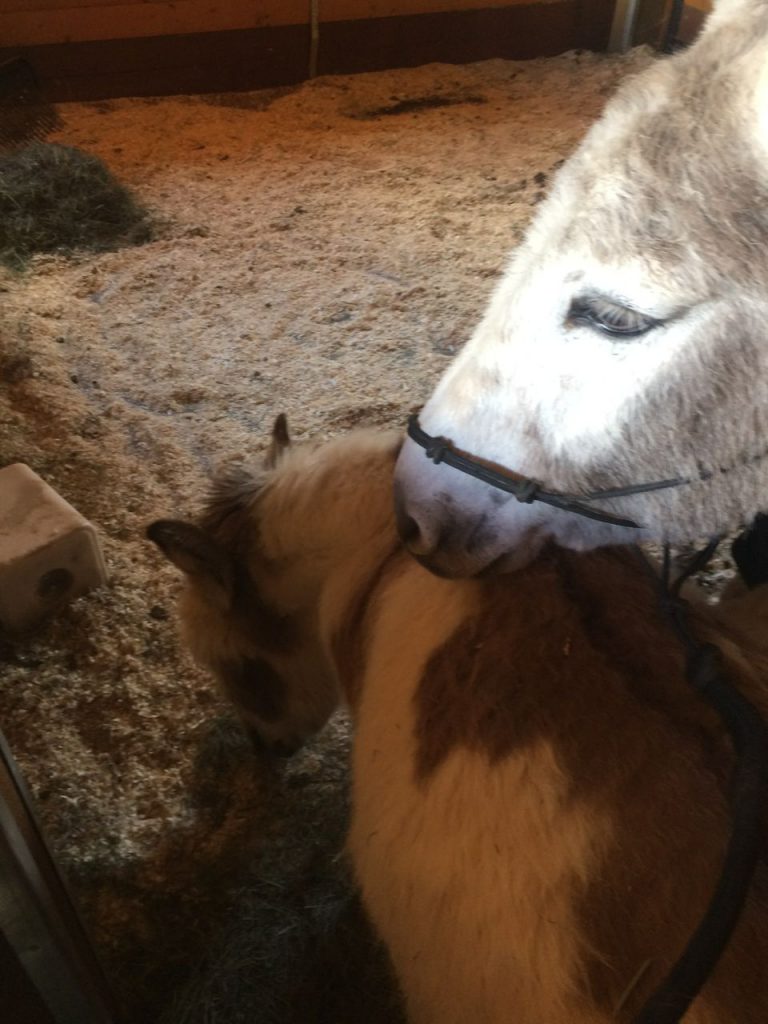
Jillkey getting her hooves trimmed and being nice, calm and trusting. She got some encouragement from little guy Sparky.
Jillkey and Julie did learn over the years to allow us to groom them and put a halter on them. I trained them to stop moving away from me when I walked up to put a halter on them. Jillkey stopped moving away every time even though she never fully trusted humans. Can’t say that I blame her. Julie became more like our well-raised mini donkeys who knew only human kindness and she followed us everywhere she could. Jillkey remained on the periphery, never coming too close just in case. We were, after all, among the species that scared and scarred her so deeply as a young donkey. I had reached a “negotiated settlement” (a term I learned from veterinary behaviorist Karen Overall) with our Jillkey: we would not pet her or come too close to her so long as she would not run from me when I did need to halter her. She complied every time. I kept my end of our bargain and so did she.
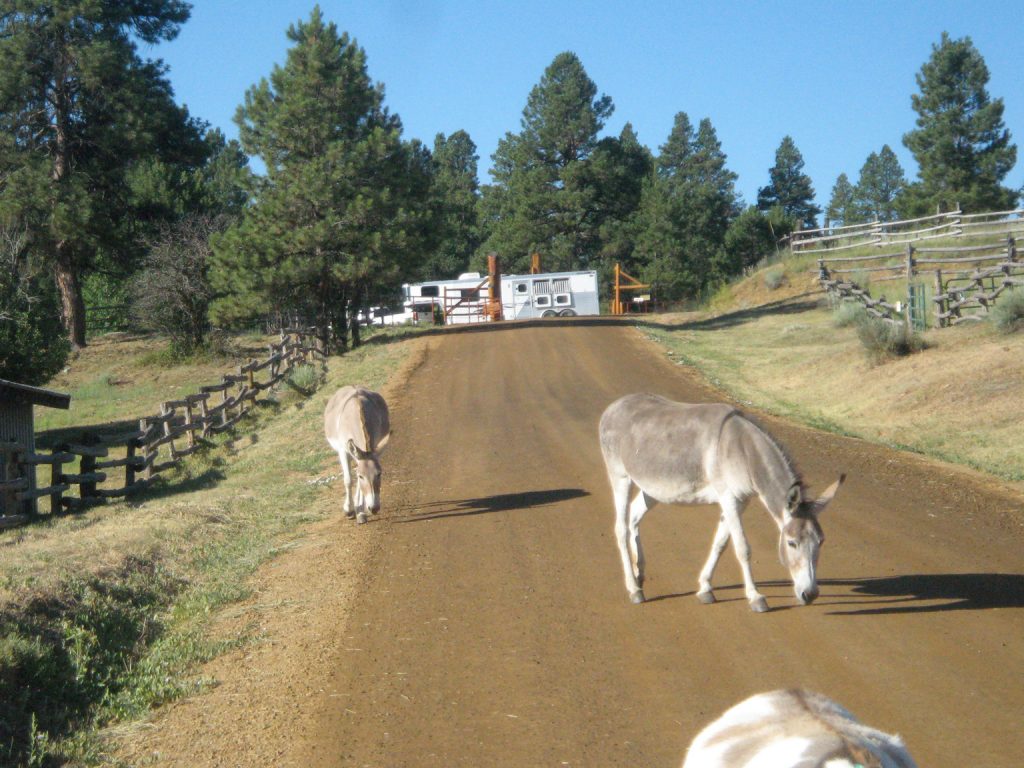
We shared our lives and moves to three different ranch properties in two states with Jillkey, Julie and our other mini donkeys. Jillkey even got to where she would stand close to me and allow me to scratch her shoulders or back a few times but she wouldn’t stay close for long. She remained hyper aware of humans, even us. She was the first to follow me in the summers when I was moving the donkeys to new pastures. She was also a fierce defender of the donkey herd against coyotes or stray dogs who got into their pasture. She had her place on her our farm and in our hearts. She was safe with us, and I believe she knew that.
And then her final day came. On the morning we were moving to a new state, Jillkey could not stand up. The disease won out. Most days I tend to the farm animals by myself with the help of my three ranch dogs as my husband worked out of state. On the day Jillkey left us, I happened to have a small human army on hand to help with the move. We had rented our property out for a year to a kind young couple who couldn’t wait to take care of our donkeys and horses for a few months so we wouldn’t have to move them to a much colder climate as winter was setting in. I had kept them apprised of Jillkey’s ups and downs and they were prepared to continue caring for her.

My dear friend, Jan, and her husband, Eric, had come by to help with the final packing chores. She first went by the barn before coming to the house to say hello to her favorite donkey, Jillkey. Jan had graciously stayed with me a few weeks earlier to help me pack in earnest. Every day she sang to Jillkey and petted her while I fed the other equines. Jillkey ate the very best when Jan was there. My friend Jan is that kind of human – compassionate, wise, funny and thoughtful so it was only natural that a formally scared donkey trusted her instantly.
That final morning Jan immediately went and sat with Jillkey to comfort her. My husband came up from the barn to tell me it was Jillkey’s last day. It was my last day on my farm as well, at least for awhile. In that moment, I allowed my tears to flow but they were as happy as they were sad because Jillkey wasn’t alone — and I wasn’t either. The donkey I saved from death’s doorstep all of those years ago brought me a person like Jan – someone strong enough and kind enough to sit with Jillkey, stroking her neck and singing and praying over her until the vet could arrive. I couldn’t do that for my donkey. I would have been hysterical so I stayed in the house, weeping as I continued the final packing.
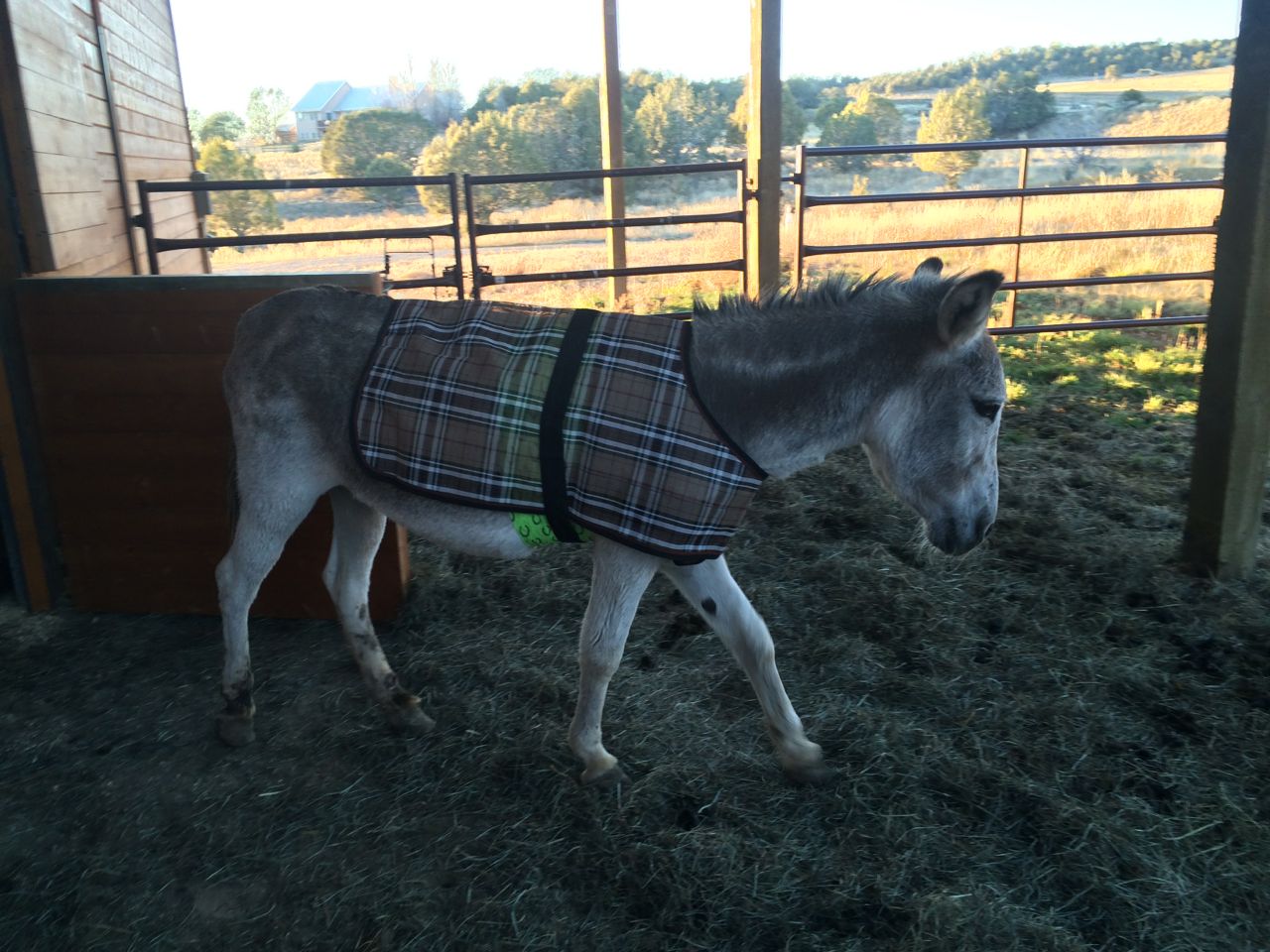
Jillkey was not going to survive, that had been clear for months. The fact that she left us on the day we were leaving our farm for a new job in another state did not go unnoticed by me or my friends that day. Jillkey could have passed any day over the past few months but she hung on and happened to pass away as I was saying my goodbyes myself, although of a different nature.
The vet came within the hour and Jan stayed sitting next to Jillkey, petting her to her and telling her what a good donkey she had been. My husband had gathered the other donkeys and put them in a stall with lots of hay after they had sniffed and observed Jillkey laying on the ground.
My wise, companionate and tough as nails friend Jen had been in the house with me helping me clean. She reminded me of the great life we had provided for Jillkey and that we had done right by her. Jen –who had buried far more than her share of beloved horses– had arranged for her neighbor to bring over the large backhoe needed to bury Jillkey. I had given her a signed check and asked her to fill in whatever amount he requested. She pulled out the check to give to him and he grabbed it from her and tore it up, saying he would not charge us for burying our beloved donkey. After Jillkey slipped away as peacefully as one can leave this earth thanks to our kind veterinarian, Jan came up to comfort me in the house while my friend Jen helped bury Jillkey. They both told me how quiet and peaceful Jillkey looked on her last day.
Winter would arrive the next day with plunging temperatures and snow. Jillkey hated to be cold when she was healthy and I was thankful she didn’t have to be in pain any more or go through another winter with her disease.
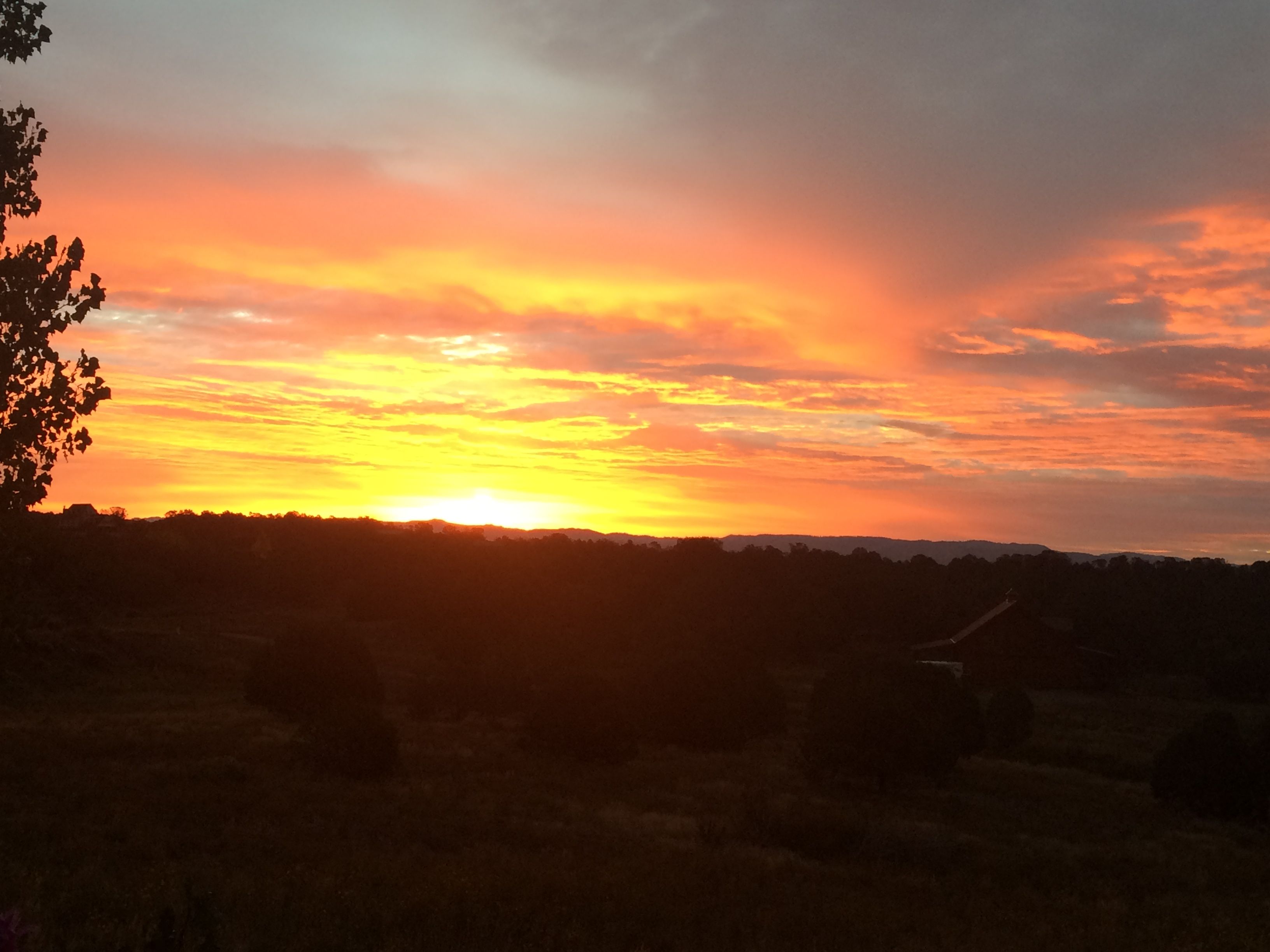
I saved a donkey long ago who taught me about perseverance, finding your loving tribe and place in the world. She showed me how to trust in spite of a terrible upbringing at the hands of hostile human beings. Jillkey allowed a small army of caring humans to ease her out of this life in the kindest way possible. Their care and love for her broke open any small, remaining part of my heart I had kept protected from people. I, too, had at last found my tribe.
Jillkey was a well-loved donkey. She wasn’t “just a donkey” to us or to our friends. We lost a family member but we also grew bigger hearts as she left us; hearts grateful for Jillkey’s life with us and for the kindness of friends who loved her as well. My friends that day formed a protective circle around my donkey and around me. I needed a village in so many ways and my village wrapped their arms around a donkey and me at the same time. Like Jillkey, my early years taught me that humans cannot be trusted . . . except for those kind-hearted few who you can trust. It took me half my life to find them but I had at last. So had Jillkey.
After Jillkey’s passing, I am left with the same question I am always left with when I look at my animals: who saved who?
